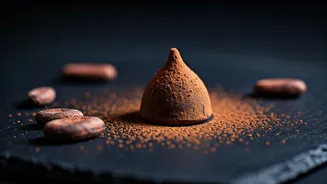Temple Food Origins
Temple foods, known as 'prasad' (an offering), hold deep religious significance in India. They are considered blessed and are often distributed to devotees
after prayers. These foods are not just meals; they represent a connection between the deity and the devotee, signifying devotion and faith. The preparation of these foods often follows strict traditional recipes and methods, ensuring purity and maintaining the spiritual essence. Different regions have their unique prasad based on local ingredients and culinary practices, reflecting the diversity of Indian culture.
Tirupati Laddu, Andhra Pradesh
The Tirupati Laddu, originating from Andhra Pradesh, is arguably one of the most famous temple offerings in India. This sweet, made with gram flour, sugar, ghee, cashew nuts, and cardamom, is offered to Lord Venkateswara at the Tirumala Tirupati temple. It is a registered Geographical Indication (GI), indicating its unique origin and quality. Millions of laddus are made daily, following strict protocols to maintain their authenticity and taste. Devotees eagerly await receiving this prasadam, considering it a blessing from the deity.
Jagannath Mahaprasad, Odisha
Jagannath Mahaprasad is the sacred food offered to Lord Jagannath at the Jagannath Temple in Puri, Odisha. This is prepared in a massive kitchen, one of the largest in the world, using traditional methods. The Mahaprasad includes a variety of dishes, such as rice, dal, curries, and sweets, all prepared without the use of onions and garlic, following the temple's customs. The food is first offered to the deity and then distributed to devotees, who consider it immensely auspicious. The preparation and distribution of the Mahaprasad are integral to the temple's daily rituals and community life.
Pongal, Tamil Nadu
Pongal, a dish made from rice, lentils, and spices, is a vital part of the Pongal festival in Tamil Nadu. This dish signifies abundance and prosperity and is traditionally cooked in earthen pots during the festival. The cooking of Pongal symbolizes welcoming prosperity into the household. The sweet version of Pongal is made with jaggery, while the savory version often includes vegetables and spices. The sharing and eating of Pongal strengthens the community bond and celebrates the harvest season.
Modak, Maharashtra
Modak, a sweet dumpling made from rice flour and stuffed with coconut and jaggery, holds a special place in Maharashtra's culinary traditions, especially during the Ganesh Chaturthi festival. It's believed to be the favorite sweet of Lord Ganesha, and offering modaks is a significant part of the festivities. The process of making modaks, whether steamed or fried, is often a communal affair, with families and friends coming together. The soft, sweet taste and the festive association make Modak a cherished treat.












